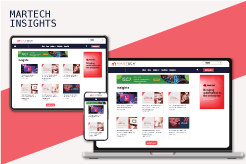WP Engine, a global web enablement company providing premium products and solutions for websites built on WordPress, published The State of Headless 2024, a research report highlighting the widespread adoption of headless web architecture among industry leaders. The international survey found that 73% of respondents now use headless, and nearly 98% of those not currently using this web architecture plan to evaluate headless solutions over the next 12 months.
Read the MarTech News: Oracle & AWS Reveal New Strategic Partnership
“The results of WP Engine’s 2024 Headless Report truly underscore the importance of investing in modern, flexible technologies that not only better equip organizations for the future but also position them to drive more impactful and cohesive web experiences”
The research, commissioned by WP Engine and conducted by Censuswide in July 2024, surveyed 1,015 chief technology officers, chief marketing officers, and IT decision makers from organizations achieving an average of approximately USD 800 million in annual revenue. Responses from across the U.S., UK, and Australia were analyzed to understand how and why industry leaders are adopting and utilizing headless web architecture to optimize their websites.
“The results of WP Engine’s 2024 Headless Report truly underscore the importance of investing in modern, flexible technologies that not only better equip organizations for the future but also position them to drive more impactful and cohesive web experiences,” said Ramadass Prabhakar, Chief Technology Officer at WP Engine.
Ramadass added, “Headless is no longer an emerging technology, it is a mainstay that organizations will need to fully embrace to maintain a competitive advantage and manage digital change effectively.”
Key Findings
Adoption is increasing and barriers are being removed.
- The adoption of headless architecture has increased with 73% of all businesses surveyed now using this website architecture. This represents a 14% increase from similar research in 2021 and a nearly 40% increase from 2019.
- Despite 65% of 2024 respondents citing budget concerns as a barrier, 83% agree that digital experiences are important to their organization’s success and 60% believe their organization’s website infrastructure budget will increase in the next 12 months.
- 16% of respondents expect a 26%- 35% impact on bottom-line financials following headless implementation, while another 16% expect an 11%- 20% impact.
Those using headless technology feel better equipped for the future.
- Organizations that have implemented headless architecture are more likely than those who have yet to adopt it to rate their organization’s ability to scale websites as good, responding at 79% and 62%, respectively.
- 80% of businesses surveyed said headless architecture keeps their organization ahead of competitors when delivering new digital experiences. Nearly 70% pointed to competitiveness as the top benefit of using headless.
- More than 70% of respondents view enhanced technology and innovation as top benefits of using headless within their organizations, with 26% specifically citing omnichannel enablement as a key advantage.
- Just over a fifth of companies with 250-499 employees cite AI integrations as one of the primary reasons for using headless.
Chief Marketing Officers are more involved in the adoption and utilization of headless than chief technology officers.
- CMOs are significantly more likely than CTOs to be heavily involved in developing, designing, marketing, or managing their organization’s website, with 63% of CMOs surveyed saying they are heavily involved compared to 52% of CTOs.
- 75% of CMOs surveyed are currently using a headless technology approach with their company’s website(s) and 81% agree that implementing headless technologies makes it easier for organizations to deliver a consistent content experience.
- CMOs are 11% more likely than CTOs to integrate different tools with headless technology, however, they are 18% more likely to find it more challenging to manage these tools and report results.



